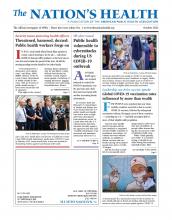US care last among high-income nations
The U.S. health care system ranks last when compared to other wealthy countries, according to a new analysis from the Commonwealth Fund.
An Aug. 4 report found that when compared to 10 other high-income countries, people in the U.S. are more likely to be unable to afford health insurance, suffer early death from a lack of timely health care and have their treatment slowed by administrative red tape.
The U.S. also has the widest health disparity between high- and low-income people, according to “Mirror, Mirror 2021 — Reflecting Poorly: Health Care in the U.S. Compared to Other High-Income Countries.”
The report compared patient outcomes in the U.S. and 10 other countries: Australia, Canada, France, Germany, the Netherlands, New Zealand, Norway, Sweden, Switzerland and the U.K. Researchers looked at access to care, care processes, administrative efficiency, equity and health care outcomes.
Norway was ranked No. 1, in part because of its excellent access to care, communication among health care providers, and patient use of web-based health care portals.
For more information, visit www.commonwealthfund.org.
— Jacqueline Yao
Health disparities linger across US
Health disparities in the U.S. are both persistent and, oftentimes, getting worse, according to a recent report from America’s Health Rankings.
Released in June by the United Health Foundation, the report and accompanying interactive website are based on decades of data on dozens of health-related measures, including social determinants.
At the national level, for example, the new report found “deep and persistent” disparities in mental and behavioral health by gender, educational attainment, and race and ethnicity. Other key findings included ongoing and growing disparities in maternal death rates, and gaps in food security.
Americans without a high school education face the greatest health, economic and social challenges, as well as the biggest health disparities.
For more information, visit www.americashealthrankings.org.
— Kim Krisberg

Long-term COVID-19 can be classified as a disability, U.S. officials said in July.
Courtesy Twinsterphoto, iStockphoto
Long-term COVID-19 qualifies as disability
Long-term COVID-19 can be classified as a disability under the Americans with Disabilities Act, U.S. officials said this summer.
In a July 26 guidance, the U.S. Department of Health and Human Services and Department of Justice said that long-term COVID-19 meets classification requirements if it “substantially limits one or more major life activities.”
“People whose long COVID qualifies as a disability are entitled to the same protections from discrimination as any other person with a disability under the ADA,” the guidance said.
People with long-term COVID-19 have symptoms that persist long after the initial illness, such as fatigue, headaches, cough, dizziness and difficulty concentrating. Reasonable modifications should be made to accommodate people with long-term COVID-19, such as providing additional time on a test for a student who has difficulty concentrating, or allowing someone with dizziness to sit while standing in line, the guidance said.
For more information, visit www.hhs.gov/civil-rights.
— Michele Late
- Copyright The Nation’s Health, American Public Health Association









